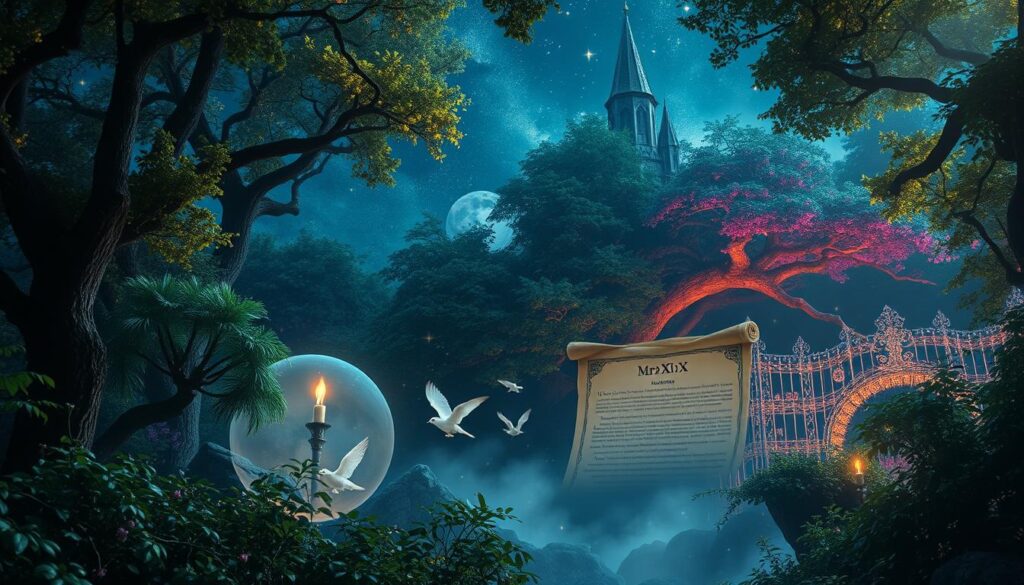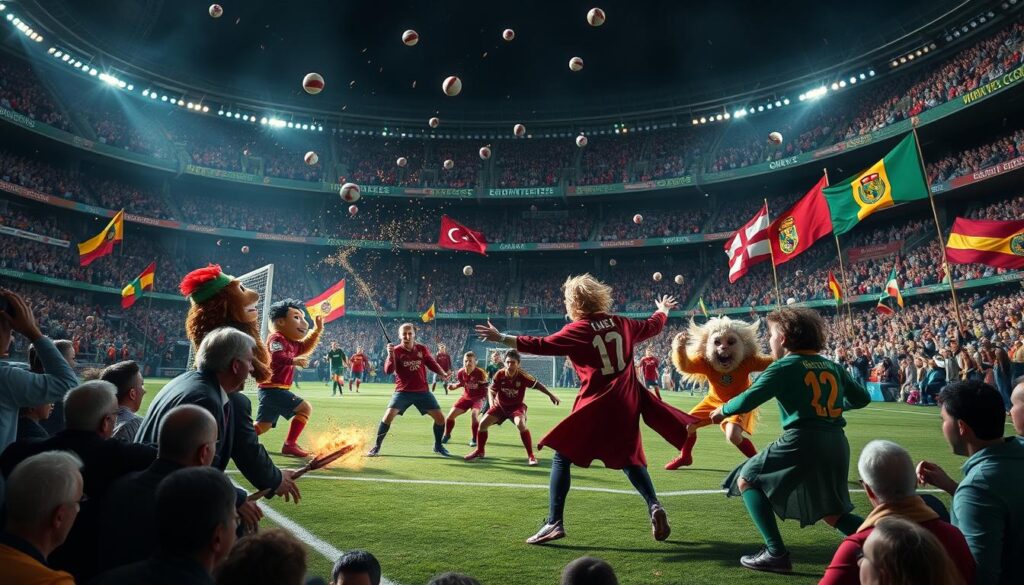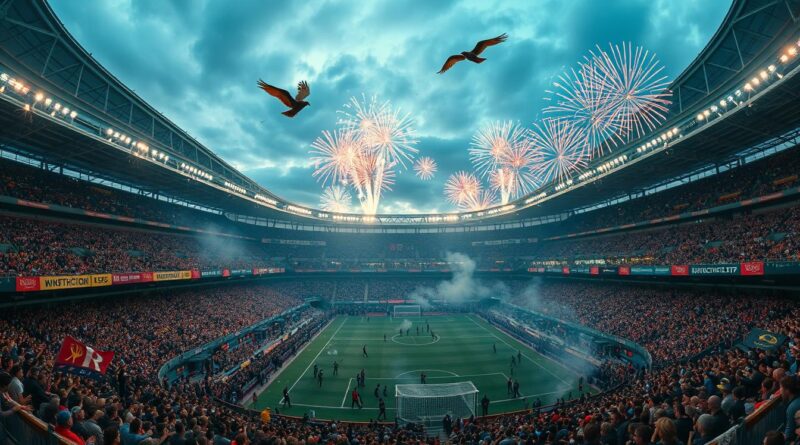Quidditch World Cup History: A Magical Journey
As we approach a new era in wizardry, the Quidditch World Cup’s legacy calls to every fan. It invites us to embark on a magical journey filled with emotions, competition, and friendship. Imagine yourself in a roaring stadium, surrounded by excitement as teams from all over the world compete in this thrilling wizarding sport.
This is more than just a game; it’s a heritage steeped in the history of quidditch since 1473. Every match reminds us of incredible feats that show not just athleticism, but also camaraderie and national pride. Let’s explore the captivating history of the Quidditch World Cup and celebrate the moments that unite us across generations.
Key Takeaways
- The Quidditch World Cup has been celebrated since 1473.
- Each tournament showcases teams from various countries, creating a global community.
- The thrilling format combines skill, strategy, and a bit of magic.
- Historic matches have shaped fans’ experiences and memories.
- The tournament embodies traditions that connect fans across generations.
About the Quidditch World Cup
The Quidditch World Cup is a big deal in the wizarding world. It’s an international quidditch competition held every four years. About one hundred thousand fans from all over come to watch, all excited for the sport.
Organizing this event is a big job. They make sure Muggles don’t find out about the magic happening. They pick secret locations and use strong security to keep it hidden.
Teams from all over compete for the gold cup trophy. Fans cheer on their favorite teams, adding to the excitement. The atmosphere is full of energy and passion.
The Quidditch World Cup is more than just a game. It’s about national pride and teamwork. Fans celebrate wins and support their teams through losses. The tournament is filled with memorable moments and intense rivalries.
- Held every four years
- Around 100,000 attendees expected
- Venues in isolated locations
- Ultimate goal: capturing the coveted trophy
- Rich history steeped in rivalry
Quidditch World Cup History
The Quidditch World Cup has a long and exciting history, starting in 1473. It has grown from a European event to a global tournament. Now, teams from all over the world compete, showing Quidditch’s worldwide appeal.
In 1994, the World Cup was held in Devon, in a special stadium on Dartmoor. This was a big change from past venues, making the event more exciting for fans. By 2014, the tournament was in Argentina’s Patagonian desert, showing its global reach.
Every four years, the tournament draws in fans with its matches. These games show off the teams’ skills and strategies. They also lead to controversies, making the event even more interesting.
The Quidditch World Cup is a key part of wizarding culture. It shows how the sport has evolved. As it grows, the tournament remains a symbol of the passion of its players and fans.
The Origins of the Quidditch World Cup
The Quidditch World Cup started in 1473, marking a big step in its history. This first event set the stage for a competition loved by fans all over the world. But, it wasn’t easy, as early games struggled with fair play issues.
First Edition: The 1473 Tournament
The 1473 tournament is a key part of Quidditch’s story. It showed amazing athleticism but was also chaotic. An incredible 700 fouls were committed, showing the need for better rules and referees.
The final match between Flanders and Transylvania was intense. It sparked excitement and debate among the crowd.
Only European Teams Competing
In 1473, only European teams played, showing the sport’s early focus on the region. As Quidditch grew, it welcomed teams from around the world. This change made the sport more diverse and exciting.
This move set the stage for future tournaments. It made the Quidditch World Cup a global event.
Regulations and Governing Bodies
The Quidditch World Cup follows strict quidditch world cup regulations. The International Confederation of Wizards’ Quidditch Committee (ICWQC) oversees these rules. They make sure the game is fair and safe for everyone.
The ICWQC also checks if teams follow the rules. They pick the referees to make sure the game is played right. This helps keep the sport honest and exciting.
These rules are made to keep players safe and fair. They make sure everyone plays by the same rules. This way, no team has an unfair advantage.
Teams from all over the world, like Argentina, Australia, and Egypt, compete. The quidditch world cup regulations make sure everyone has a fair chance. There are qualifying phases to pick the best teams for the knockout stage.
The Statute of Secrecy’s Impact
The International Statute of Wizarding Secrecy was created in 1692. It’s key to keeping the Quidditch World Cup safe. This law keeps magic hidden from non-magical people, or Muggles. With many fans coming, keeping everyone safe is a big job.
Security Measures for Spectators
Security is tight to keep the magic world hidden. Here’s what’s done:
- Transport to the event is limited to avoid Muggle sightings.
- Apparition points are set up far from Muggle areas.
- The Ministry of Magic watches for any security issues.
Keeping fans safe is a top priority. These steps help the magical community celebrate without worrying about Muggles finding out.

Quidditch World Cup Format and Qualifying
The Quidditch World Cup format is as exciting as the sport itself. It involves several stages to ensure top competition. Teams from all over the world go through a detailed qualifying process before the big event. This not only shows national pride but also raises the game’s standards.
Qualification Process Overview
The qualifying process for the Quidditch World Cup lasts two years. Teams start in a group stage where they earn points based on their wins and how well they do. A special scoring system makes sure every win counts, showing how crucial each game is.
- Each team gets two points for a win.
- More points are given for how big the win is.
- If scores are tied, catching the Snitch decides the winner.
- The top teams from each group move on to the knockout stage.
Knockout Tournament Structure
After qualifying, the tournament turns into a knockout format. This means teams face each other in thrilling matches. Usually, sixteen teams make it to the knockout rounds, all fighting for the top prize.
As the tournament goes on, fans see amazing athleticism and strategy. The matches get more intense, changing the game’s balance. Only the most worthy teams will win, moving closer to the final.
Notable Quidditch World Cup Matches
The Quidditch World Cup has seen many exciting matches over the years. The 1809 tournament was a highlight, but it also caused controversy. Despite this, the tournament is known for its unforgettable moments and incredible talent.
Mediocre Moments: The 1809 Controversy
The 1809 tournament was marked by chaos and tension. Disputed calls and player conflicts were common. The strict fouling rules affected the game, leading to heated reactions from fans.
Yet, the event is a key part of the Quidditch World Cup’s history. It shows the importance of sportsmanship and fair refereeing.
Memorable Upsets and Highlights
Thrilling upsets and stunning plays have always captivated fans. One match saw an underdog team beat a favorite, showing the tournament’s unpredictability. Teams like the Bulgarian Vratsa Vultures have achieved incredible victories, including seven wins in the European Cup.
These electrifying moments are what make the tournaments so special. They highlight the competitive spirit of quidditch.
| Match Year | Teams Involved | Notable Outcome |
|---|---|---|
| 1473 | Various teams | First tournament showcased all 700 possible fouls. |
| 1809 | Underdog vs Favorite | Controversial calls led to chaos. |
| 1652 | Bulgaria vs Various | Vratsa Vultures won their seventh European Cup. |
Quidditch World Cup Winners
Over the years, the Quidditch World Cup has celebrated many quidditch world cup winners. This has created a rich history of champions. Team success sparks rivalries and inspires new players and fans. Many nations have made a lasting impact on the tournament.
Celebrating Historic Champions
The Quidditch World Cup started in 1473. It has seen champions from all over the world. The first winners, Transylvania and Flanders, set the stage for future legends. Other notable winners include:
- New Spain (1809)
- Australia (1966)
- Syria (1974)
- Canada (1990)
- Ireland (1994)
- Egypt (2002)
- Bulgaria (2014)
These champions show the spirit and talent of the Quidditch World Cup. They bring pride to their countries and recognition worldwide.
Recent Trend: Dominance of Certain Teams
Recently, some teams have dominated the Quidditch World Cup. This has made the games exciting for fans. Countries like Australia and Ireland are often in the finals. Their success inspires new teams to win.
This competition builds anticipation for each World Cup. It makes fans eagerly wait for the next tournament.
| Year | Champion | Runner-Up |
|---|---|---|
| 1473 | Transylvania | Flanders |
| 1809 | New Spain | Argentina |
| 1966 | Australia | United States |
| 1974 | Syria | Canada |
| 1990 | Canada | Bulgaria |
| 1994 | Ireland | United States |
| 2002 | Egypt | Australia |
| 2014 | Bulgaria | Ireland |
Quidditch World Cup Records
The Quidditch World Cup is a showcase of amazing achievements in the sport. It captures the spirit of competition and athleticism. Players strive to break records, leaving a lasting impact on the wizarding world.
Some of the most notable records include the most goals scored in a match and the fastest Snitch catch. These records highlight the skill and determination of the players.
Most Goals Scored in a Single Match
The record for most goals in a match shows the players’ skill and teamwork. Matches often become thrilling displays of agility and strategy. The goal totals in these matches are staggering, showing the players’ relentless pursuit of excellence.
Each world cup brings a new chance for players to challenge these records. They get to showcase their unique talents and skills.
Fastest Snitch Caught Ever
The quest for the fastest Snitch catch is a key part of the Quidditch World Cup. Athletes work hard to catch the golden Snitch and win for their teams. The record shows not just speed but also quick reflexes and smart play.
As each world cup comes, fans look forward to the fast-paced chases. They hope to see a new record set in the future.
Quidditch World Cup Controversies
The Quidditch World Cup has faced many controversies. These include issues like sportsmanship, safety, and ethics. Fans and players have raised concerns about magical manipulation that could affect the game’s fairness.
These debates have made everyone question what fair play really means in such a competitive event.
Magical Manipulation Allegations
There have been claims of magical manipulation in some matches. The match between Ireland and Bulgaria is a prime example. Ireland was leading by 160 points, but Bulgaria’s Victor Krum caught the Golden Snitch, changing the score to 170-160 in favor of Bulgaria.
This has sparked discussions about whether outside forces influenced the game. It shows the ongoing quidditch world cup controversies that surround the tournament.
The Dark Mark Incident of 1994
The 1994 Quidditch World Cup was marred by the Dark Mark being cast over the stadium. This caused panic and chaos, leading to injuries for about 300 spectators. The incident raised serious concerns about the tournament’s safety.
It made officials rethink the security measures needed for such events. This shows the fine line between excitement and danger in magical sports.

| Incident | Year | Details |
|---|---|---|
| Magical Manipulation Allegations | 1994 | Accusations during Ireland vs. Bulgaria match. |
| Dark Mark Incident | 1994 | Chaos caused injuries to 300 attendees. |
| Illegal Snitch Capture | 1998 | Haiti disqualified against Brazil; illegal play. |
| Sudden Collapse of Player | 2002 | Jamaican Keeper’s collapse led to match investigation. |
Quidditch World Cup Trivia
The Quidditch World Cup is filled with exciting stories and unforgettable moments. Quidditch world cup trivia offers fun facts that make the event even more special. From its start to today, fans love learning about its importance in the Wizarding World.
Fun Facts and Anecdotes
The Quidditch World Cup started in 1473, with only European teams at first. Now, it’s a big event every four years, attracting about a hundred thousand fans. The Seeker’s role is key, as catching the Golden Snitch ends the game and scores 150 points.
In 2014, Nigeria and Norway were the top teams, showing the tournament’s fierce competition. Dartmoor, England, saw a major controversy with the Death Eaters, and the Ministry of Magic stepped in. Barty Crouch Jnr’s act of firing the Dark Mark into the sky was a turning point.
- In Dartmoor, England, a significant controversy arose involving the Death Eaters, with Ministry of Magic personnel intervening during the chaos.
- Barty Crouch Jnr infamously fired the Dark Mark into the sky at this event, creating a historical upheaval.
- The first World Cup final featured teams from Transylvania and Flanders, shrouded in accusations of cheating.
Behind-the-Scenes Insights
Organizing the Quidditch World Cup is a big job to keep it secret from Muggles. Handling a huge crowd while keeping it hidden is a challenge. The event’s excitement creates a lively atmosphere that fans love.
Historical moments, like the 421st World Cup final lasting five days, show the players’ and fans’ dedication. The 422nd World Cup had exciting matches like Ireland vs. Peru and England vs. Transylvania. These games add to the tournament’s rich history.
Legacy of the Quidditch World Cup
The quidditch world cup legacy is deeply felt in the magical world. It’s more than just games and scores. It brings wizards and witches together, creating a bond that shows its true value.
Every tournament adds to the sport’s rich history. It tells stories of legendary players and epic matches. These moments create a sense of community among fans and players.
The upcoming Harry Potter: Quidditch Champions game will add to this legacy. It will be available on many platforms, letting fans dive into the quidditch world. Players will compete for their countries, making the sport even more meaningful for the next generation.
The quidditch world cup continues to grow in importance. It teaches the values of teamwork and friendship. These values enrich the wizarding world’s culture.
| Year | Event | Cultural Impact |
|---|---|---|
| 2024 | Launch of Harry Potter: Quidditch Champions | Reinvigorates interest in quidditch |
| 1994 | The Dark Mark Incident | Heightened awareness and security in sports |
| 1809 | Controversial Match | Prompts reforms in regulations |
Future of the Quidditch World Cup
The future of the Quidditch World Cup is filled with excitement and passion. The magical community’s love for the sport is growing. As it evolves, new tournaments will bring thrilling moments and better competition.
Since 1473, the Quidditch World Cup has changed to meet player and fan needs. Countries like Argentina, Australia, Brazil, and the United States are now part of the action. Teams compete in a knockout format, giving each a chance to shine.
The trophy, a gold artwork with a Snitch on top, represents excellence and tradition. The International Confederation of Wizards Quidditch Committee works hard to keep the game fair. Each World Cup is held every four years in a new country, celebrating the wizarding world’s diversity.
As quidditch becomes more popular, new teams and stories are on the horizon. Fans can look forward to new features and events. These might include video game expansions and events that connect different magical regions, blending old and new traditions.
| Year | Winner | Host Country |
|---|---|---|
| 1809 | New Spain | N/A |
| 1966 | Australia | N/A |
| 1994 | Ireland | England |
| 2014 | Bulgaria | N/A |
The magic of teamwork and competition will keep the Quidditch World Cup alive. It will bring joy to players and fans, ensuring the sport’s spirit endures for years to come.
Quidditch World Cup Highlights and Celebrations
The Quidditch World Cup is a grand event that brings fans from all over to celebrate the sport. Each tournament has unforgettable moments that show the passion and skill of the teams. The crowd goes wild, cheering on amazing Chaser goals and incredible plays.
The 2014 Quidditch World Cup final was a thrilling match. Bulgaria beat Brazil with a score of 170 to 60. This victory sparked huge celebrations among fans. VIP boxes were filled with famous faces, showing how much the wizarding world cares about the sport.
- The Potter family showed their support for Bulgaria, but Albus wore green for Brazil.
- Veela mascots added excitement for everyone in the VIP box.
- Viktor Krum became the oldest winner of the Quidditch World Cup, making the tournament even more special.
Events like the Second Annual Philadelphia Brotherly Love Cup have also gained popularity. This tournament, a non-magical version of quidditch, drew a lot of players and fans. It shows how quidditch brings people together, creating a sense of unity and joy for fans everywhere.
Conclusion
The Quidditch World Cup is more than just magical matches. It’s a mix of competition, friendship, and history. Over the years, teams like Gryffindor, Hufflepuff, Ravenclaw, and Slytherin have made their mark. Each team has added its own story to the tournament’s rich history.
Since its start in 1473, the Quidditch World Cup has grown and changed. It has won the hearts of witches and wizards worldwide. Legendary moments, like those from Minerva McGonagall and James Potter, remind us of the sport’s heroes. Every match is a celebration of talent and spirit, set against beautiful venues.
The Quidditch World Cup’s future looks bright, inspiring new fans. It’s a mix of tradition and innovation, making it a key part of the magical world. It will continue to be a cornerstone of the magical community for years to come.
FAQ
What is the Quidditch World Cup?
The Quidditch World Cup is a big event every four years. It brings together teams from all over the world to play Quidditch, a sport from the wizarding world.
When was the first Quidditch World Cup held?
The first Quidditch World Cup was in 1473. It was just for European teams and started a long tradition in wizarding sports.
How are teams qualified for the Quidditch World Cup?
Teams qualify by playing in groups and earning points over two years. The top teams then move on to the knockout stage.
Who oversees the regulations of the Quidditch World Cup?
The International Confederation of Wizards’ Quidditch Committee (ICWQC) makes sure the tournament is safe and follows the rules. They also oversee matches.
What are some memorable Quidditch World Cup matches?
The tournament has seen many exciting matches. The 1809 tournament was chaotic, and there have been many upsets that have thrilled fans.
Which teams have been the most successful in the Quidditch World Cup?
Teams like Transylvania, Australia, and Ireland have won often. Recent tournaments have seen other teams rise to the top, creating rivalries.
What are some notable Quidditch World Cup records?
The tournament has set records like the most goals in a match and the fastest Snitch caught. These records show the sport’s amazing achievements.
Have there been any controversies in the history of the Quidditch World Cup?
Yes, there have been controversies. Issues like magical cheating and the Dark Mark in 1994 have sparked debates about fairness.
What kind of trivia surrounds the Quidditch World Cup?
There are fun facts about players, committees, and behind-the-scenes moments. These add to the tournament’s cultural significance.
What is the cultural significance of the Quidditch World Cup?
The tournament brings wizards together, celebrating Quidditch. It creates memories that inspire new players and fans.
What does the future hold for the Quidditch World Cup?
The tournament will keep evolving, introducing new changes and tackling challenges. It will remain a beloved part of magical culture.
How is the atmosphere during the Quidditch World Cup celebrations?
Celebrations are lively and diverse. They show the passion of the competition. Teams perform amazing plays, and fans come together to enjoy the magic of Quidditch.
Source Links
- 1994 Quidditch World Cup
- Quidditch
- Quidditch (real-life sport)
- Harry Potter: Quidditch World Cup
- Harry Potter: Quidditch World Cup – MuggleNet
- Harry Potter: Who Won The Quidditch Cup Each Year (1991-1998)
- Quidditch World Cup – Harry Potter Lexicon
- IQA World Cup
- When Was The First Quidditch World Cup?
- History of the Quidditch World Cup | Wizarding World
- Quidditch World Cup
- Quidditch World Cup
- Quidditch: An Introduction to This Actual Sport (Yes, It’s Real)
- International Statute of Wizarding Secrecy
- 1692-1881 – The Wizarding World in Secret Timeline – Harry Potter Lexicon
- 1400-1692 – Growing Distrust and Prejudice Timeline – Harry Potter Lexicon
- UTSA and the Warriors Win USQ Cup 2023 — US Quadball
- Harry Potter 101: Quidditch part one | Wizarding World
- All National Teams and how to unlock them in Harry Potter Quidditch Champions – Backdash
- Quidditch World Cup
- Quidditch
- 27 years ago today, Victor Krum ends the Quidditch World Cup in a controversial way. What happened?
- Quidditch World Cup 2014: Daily Prophet reports | Wizarding World
- The Quidditch World Cup Quiz
- Quidditch World Cup
- Harry Potter: Quidditch Champions
- FAQ | Harry Potter: Quidditch Champions
- Quidditch Champions Missed A Big Opportunity For Harry Potter School Lore
- All National Teams in Quidditch Champions (& How to Unlock Them)
- J.K. Rowling’s Pottermore 2014 Quidditch World Cup final Dumbledore’s Army highlights
- Quidditch World Cup 2014 – Harry Potter Lexicon
- Quidditch among highlights of Harry Potter Weekend – WHYY
- Inter-House Quidditch Cup
- The History of Quidditch
- 2014 Quidditch World Cup final




